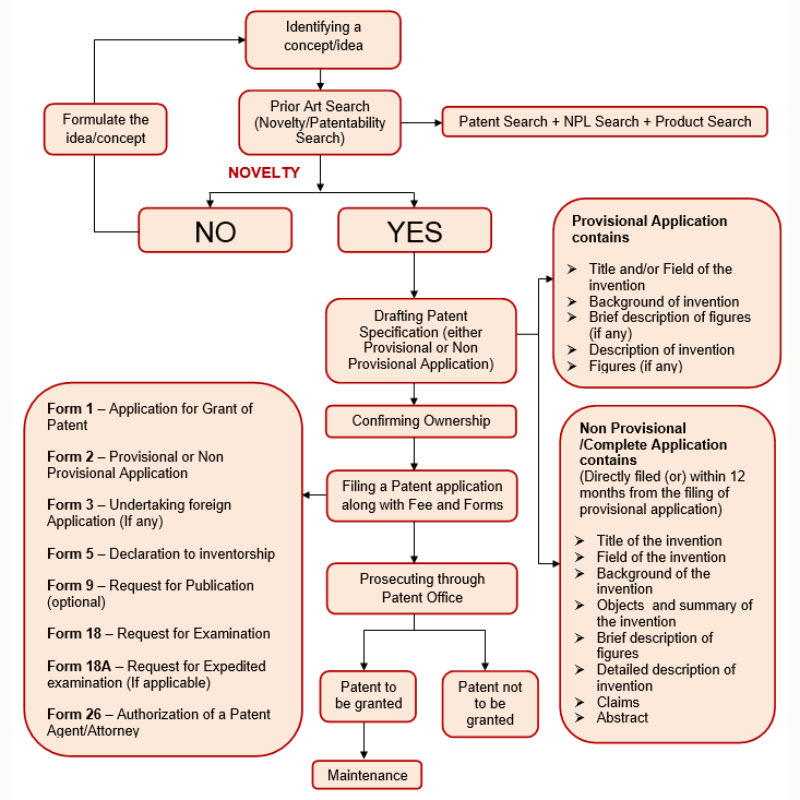
The Patent Amendment Rules 2024 has been notified to amend the patent rules, 2003. The rules aim to simplify obtaining and managing patents, fulfilling the Viksit Bharat Sankalp. Read here to learn more.
In India, patents are granted by the Indian Patent Office, which operates under the Department of Industrial Policy & Promotion, Ministry of Commerce and Industry.
The process is governed by the Patents Act, 1970 (as amended) and the Patents Rules, 2003 (now amended in 2024).
The Patents Amendment Rules, 2024 and the Patent (Second Amendment) Rules, 2024 have been notified and have come into force from the date of Publication in the Official Gazette i.e. 15 March 2024 and 16 March 2024 respectively.
What is a Patent?
A Patent is granted to an ‘invention’ which may be used for developing innovative products and services.
- As per Section 2 (1) (j) of the Patent Act, 1970, ‘invention’ means a new product or process involving an inventive step capable of industrial application.
According to WIPO, “A patent is an exclusive right granted for an invention, which is a product or a process that provides, in general, a new way of doing something, or offers a new technical solution to a problem. To get a patent, technical information about the invention must be disclosed to the public in a patent application.”
- It is a statutory right granted by the respective governments.
- It gives the exclusive rights and bars others from making, using, selling, and importing products or processes, based on the patented invention without prior permission.
- It is granted for 20 years.
- Criteria for a patent are that it should be novel, must involve an inventive step, capable of industrial production, etc.
- India has ratified the Patent Cooperation Treaty (PCT).
- Indian patent office has granted more than 1 lakh patents between Mar 2023 to Mar 2024.
Patent Amendment Rules 2024
The Ministry of Commerce and Industry notified the Patents Amendment Rules 2024 to amend the Patents Rules, 2003. The provisions came into force on 15-3-2024.
Key changes introduced under Patents Amendment Rules 2024:
- Revised Due Date for Request for Examination: The deadline for filing a Request for Examination (RFE) in a patent application has been reduced from 48 months to 31 months from the earliest priority date.
- Simplified Submission of Form 3: Patent applicants are now required to submit details of corresponding applications on Form 3 only twice.
- Introduction of ‘Certificate of Inventorship to recognize inventors’ contributions to patented inventions.
- 10% reduction in renewal fees if paid in advance through electronic mode for at least 4 years.
- The frequency of filing statements of working patents was reduced from once in a financial year to once every three financial years.
- Empowerment of Controller: The Controller has been granted authority to extend periods specified in the Rules and to condone delays for up to six months.
- Amendments in Pre-grant and Post-grant Opposition Procedures: The time frame for submission of recommendations by an Opposition Board and the response time for applicants have been adjusted.
Patents (Second Amendment) Rules 2024
The Ministry of Commerce and Industry notified the Patents (Second Amendment) Rules 2024 to amend the Patents Rules, 2003. The provisions came into force on 16-3-2024.
A new Chapter XIVA relating to “Adjudication of Penalties and Appeals” has been inserted under which any person can file a complaint to the adjudicating officer (‘AO’) through electronic means regarding any contravention committed under the following Section of the Patents Act, 1970:
- Section 120: Unauthorized claim of patent rights
- Section 122: Refusal or failure to supply information
- Section 123: Practice by non-registered patent agents.
How are patents granted in India?

The procedure for obtaining a patent in India involves several steps, as outlined below:
Patent Search (Optional but Recommended)
- Before filing a patent application, it is advisable to conduct a patent search to determine if the invention is novel.
- This helps in assessing the patentability of the invention against existing publications and patents.
Filing of Patent Application
- The first step in the patent grant process is to file a patent application with the Indian Patent Office. The application can be filed as:
- A Provisional Application: Filed to secure a priority date for the invention, giving the applicant 12 months to fully develop the invention and submit the complete specification.
- A Complete Application: Filed with the complete specification of the invention at the outset.
Publication of Application
- The patent application is published 18 months after the filing date or the priority date, whichever is earlier.
- Early publication can be requested by the applicant, which can occur within one month from the request.
Request for Examination
- To proceed with the patent grant process, the applicant must request an examination of the application.
- This request has to be made within 48 months (reduced to 31 months as amended) from the priority date or the date of filing of the application, whichever is earlier.
- Once the request for examination is filed, the patent application is taken up for examination.
Examination Report
- After the request for examination is filed, the application is examined by a patent examiner.
- The examiner assesses the application on various grounds, including novelty, inventive step (non-obviousness), and industrial applicability.
- The examination report, known as the First Examination Report (FER), outlines the objections or requirements to be met by the applicant.
Response to Objections
- The applicant has an opportunity to respond to the objections raised in the examination report.
- This may involve amending the claims, providing arguments against the objections, or both.
- The applicant typically has 6 months from the issuance of the FER to respond, with a possibility of a 3-month extension.
Grant of Patent
- If the response satisfactorily addresses the objections raised by the examiner, the application can proceed to be granted.
- The grant of the patent is notified in the Patent Office Journal.
- Once granted, the patent is valid for a term of 20 years from the date of applying, subject to the payment of renewal fees.
Opposition
After the patent is granted, there is a window during which third parties can file opposition to the patent. There are two types of opposition:
- Pre-grant opposition: Filed by any person before the grant of the patent.
- Post-grant opposition: Filed by any interested person within 12 months from the date of publication of the grant of the patent.
The process of obtaining a patent in India requires careful preparation and follow-through. Given the complexity of patent laws and the need for technical and legal expertise, many applicants choose to work with patent attorneys or agents.
Government initiatives for promoting patents
- National Intellectual Property Rights (IPR) Policy 2016
- National Intellectual Property Awareness Mission (NIPAM)
- Patent Facilitation Programme
- Expand Knowledge Capacity & Skill Building through initiatives like the Scheme for Pedagogy & Research in IPRs for Holistic Education and Academia (SPRIHA).
- Establishment of Centre of Excellence in Intellectual Property and Patent Analysis Management System (PAMS) by the Ministry of Electronics and Information Technology (MeitY).
- Scheme for Facilitating Start-Ups Intellectual Property Protection (SIPP) to encourage filling of Patent applications by Startups.
- The Government has launched a campaign namely the Kalam Program for Intellectual Property Literacy and Awareness Campaign (KAPILA) for Intellectual Property Literacy and creating patent awareness in 2020.
India is a signatory to the World Trade Organization (WTO), Trade Related Aspects of Intellectual Property Rights (TRIPS) agreement and party to several World Intellectual Property Organization (WIPO) treaties and agreements on Intellectual Property Rights and protects Intellectual Property Rights in compliance with these international standards.
Conclusion
Ministry of Electronics and Information Technology (MeitY) has always acknowledged R&D and promotion of innovation as an integral part of the ICT ecosystem.
Towards this, it has been supporting the entire value chain of R&D activities in the country ranging from the basic components to sophisticated product development in the sphere of ICT.
The government has recognized the need for the protection of Intellectual Property (IP) as a vital component of innovation and scientific advancement and that many of the benefits of inventions will be lost if the resulting IP is not protected.
MeitY has made significant strides in recent years in creating a conducive ICT-IPR ecosystem for the creation, protection, awareness, and commercialization of IP as well as IP Rights.
Related articles:
-Article by Swathi Satish






Leave a Reply